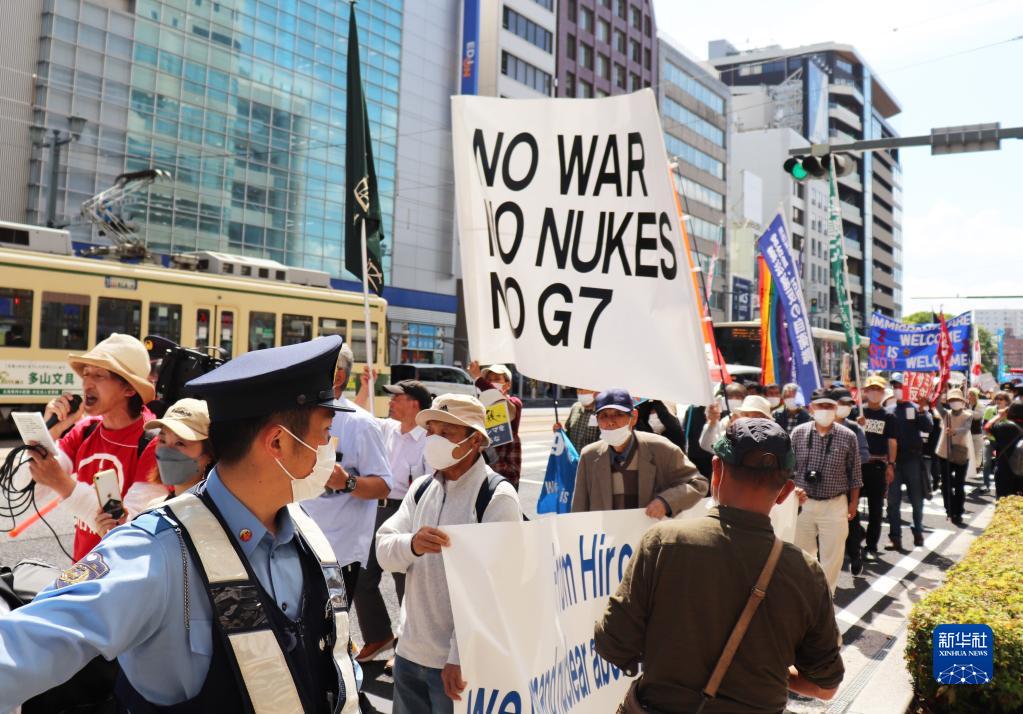By Chen Yang

People protest against the upcoming Group of Seven (G7) summit in a street of Hiroshima, Japan, on May 14. (Photo from Xinhua News Agency)
The Group of Seven (G7) summit is to be held in Hiroshima, Japan from May 19 to 21 as scheduled. On the eve of the summit, many Japanese people held up banners reading "No War Accomplices" and "No G7" to express their protests against the G7 summit in the streets of Hiroshima. The summit has not yet begun, and protests have already hiked. Such an awkward situation deserves conscientious reflection from the G7.
As the rotating presidency of the G7 this year, Japan plays a leading part in formulating relevant topics for the G7 summit. What will be the outcome of the G7 Hiroshima Summit and what topics will be the focus of discussion among member states? All hinges on the rotating presidency. According to information disclosed by Japanese media, it is easy to see that Japan intends to collude with the US to lead the G7 summit towards the abyss of bloc confrontation.
The G7 was originally founded to coordinate the Western macroeconomic policies, but in recent years, the group has played a less prominent part in economic cooperation, but has engaged itself much more in military confrontation. For example, under the instigation of the US and Japan, the G7 leaders' joint statement in 2021 included relevant content on the situation across the Taiwan Strait for the first time. At the upcoming G7 Hiroshima Summit, the topics to be discussed as set by the Japanese side include addressing the Russia-Ukraine conflict and so-called China's "economic coercion". It is not hard to see that Japan intends to exert pressure on China by means of the power of G7.
At the same time, G7 has brought noticeable challenges and hidden dangers to the region and the international community. On the eve of the G7 Hiroshima Summit, the banner reading "No War Accomplices" held up by the Japanese people just reflects their concerns and unease about the orientation of the G7 in the future. On May 14, a citizen of Hiroshima involved in the protests believed that the G7 Hiroshima Summit would be a meeting to re-escalate the Ukraine crisis. NATO has already provided military support to Ukraine, and Japan also intends to provide monetary or military support to Ukraine. “This move cannot bring an end to the war, nor can it achieve peace; instead, it can only lead the world to even worse tragedies.
G7 should not be an accomplice to war, nor should it be an accomplice to economic coercion. According to a report by the Financial Times, the US and Japan intend to make "economic security" one of the main topics at the upcoming G7 Summit. Obviously, the US is the main driver of hyping up the topic of "economic coercion", while Japan, with its selfish intentions, is ready to cater to the US. In fact, when it comes to the initiator of economic coercion, the US is the most suitable. Even members of the G7 have experienced economic coercion from the US. In the 1980s, the US forced Japan to sign the Plaza Accord, and in 2022, the US government passed the Inflation Reduction Act featuring strong unilateralism and protectionism, which aroused strong dissatisfaction from France, Germany and other countries. Enterprises from G7 member states such as Toshiba of Japan, Siemens of Germany, and Alstom of France all have been ruthlessly suppressed by the US.
If G7 member states are truly concerned about economic security, they should join hands in pressuring the US to immediately stop using national security as a pretext to suppress and contain other countries, and stop indiscriminate unilateral bullying, stop coercing its allies into forming exclusive small circles, stop disrupting the security and stability of global industrial and supply chains, and stop dividing the world into two major markets and two systems. Joseph Stiglitz, a renowned American economist and recipient of the Nobel Prize in economics, believed that the hostile US policy on China is likely to split the world into two blocs, and urged the West to offer investment to developing countries instead of preaching. It's high time for the G7 members to make a decision. Should they continue to blindly follow the US in creating small circles or proactively work together with the international community to promote peace and development? As members of the 'Rich Country Club', the G7 should not focus on the interests of a few countries and harm the interests of the vast majority of the international community. Instead, it should adapt to the trend of an open and inclusive era and deliberate how to do tangible things that are conducive to world peace, stability and development.
Editor's note: Originally published on haiwainet.cn, this article is translated from Chinese into English and edited by the China Military Online. The information and opinions in this article do not necessarily reflect the views of eng.chinamil.com.cn.













